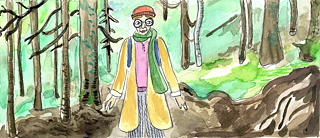A walk in the woods is the best anti-stress therapy, in Granny Trude’s opinion. And according to science, she’s right.
My dears,I hope you’re all well! Coronavirus has been defining our lives for around a year now – not really a very nice anniversary.
But I’ve found a really good way to cope, and I hope I can motivate you a little to be like me and head for the forest. Yes, the Oberbernbach Forest has become my salvation. Give it a try, it’s fascinating to find out everything a forest can do!
It started off with the fact that I’d grown sick of the sight of the same walking routes time after time during lockdown. It was time to start something new. At around the same time a film about the language of trees was showing on television, which thrilled and inspired me. It brought back some memories. As a child the woods were a fabulous adventure playground: the roots of a fallen tree transformed into my den, a tree stump became a dolls’ house with a little mossy bed, and hide-and-seek was never so much fun as amongst the bushes and trees. I highly recommend that all parents take their children into the woods more often!
Taking a bath in the forest
“Forest bathing” has been a recognised therapy form to combat mental health issues as well as cardiovascular and respiratory conditions for a long time in Japan. Anyway I was intrigued to find out whether there’s any truth in the positive effects of a forest walk. And I have to say – yes, there definitely is! Apparently in Japan they’re already issuing recipes for “immersion in the forest air”, and this idea’s gaining an increasing number of fans in Germany too. However I find it quite thought-provoking, because I used to spend a lot of time in the woods with my family. In summer we would often go raspberry-picking, it was simply something we always did. Why do we even have to be reminded about such “normal” things as forest walks? A question to which of course I know the answer as well as you do. Yet again it boils down to our oh-so-stressful daily life. What a shame!Forest air – the purest medicine
Well, thanks to the huge input from scientists we now know all about the benefits of herbal aromatic substances to boost our immune system (terpenoids, I looked it up especially for you). We also know about the increased oxygen levels in the forest that stimulate our metabolism in particular. Our heart rate normalises and blood pressure falls during a woodland walk, the lungs expand as they are regenerated with essential oils, we find peace. And our eyes have a soothing break for a change – you can just let your gaze wander, look at the trees by the distant clearing, enjoy the stillness. Wonderful! Incidentally, researchers have found that a walk in the woods reduces stress hormones and puts you in a good mood.If I haven’t convinced you yet, I don’t know what else I can say…
Special networks
The forest is absolutely full of secrets and miracles – if you allow yourself to engage with it. That’s a must. Of course you won’t experience the woodland magic if you’re clutching your phone, music blasting into your ears. In the film I mentioned earlier I learned some very interesting things about the forest. For instance trees are said to change their diameter overnight, they can communicate, warning each other of predators and setting up appropriate defence mechanisms. And if the birds sing louder, trees grow faster. They’re connected to one another through subterranean networks, which researchers term the “Wood Wide Web” – I’m not joking, go and look it up! It’s all incredibly exciting.My favourite forest facts
- Just imagine, a handful of forest earth is said to contain more living creatures than there are people in the world!
- When the dormouse wakes in May and finds barely any blossom on the beech trees, he knows that there won’t be enough beechnuts for him in autumn. So he temporarily stops reproducing. The male simply doesn’t develop reproductive organs!
- Germany’s first National Park was the Bavarian Forest and it’s celebrating its fiftieth anniversary. Together with the Bohemian Forest in the Czech Republic it makes up an area of 24,217 hectares – the largest forested area in Central Europe. That’s exactly where I’m going for my first trip out after coronavirus.
- If trees suffer from dry conditions one year they grow more slowly the following year as well, even if there’s plenty of rainfall, because they’ve remembered the problem.
- Oaks reach an average age of 800 years, it is said that oaks as old as 1,500 years have existed.
Yours, Trude
March 2021
